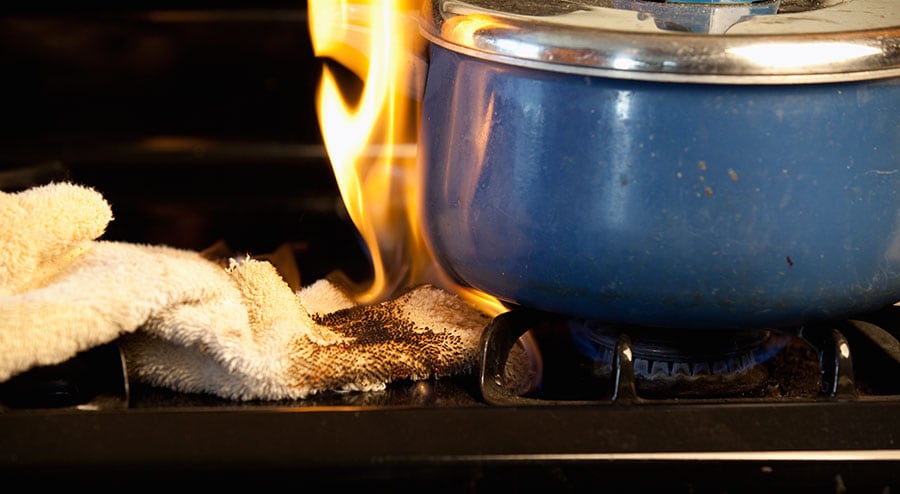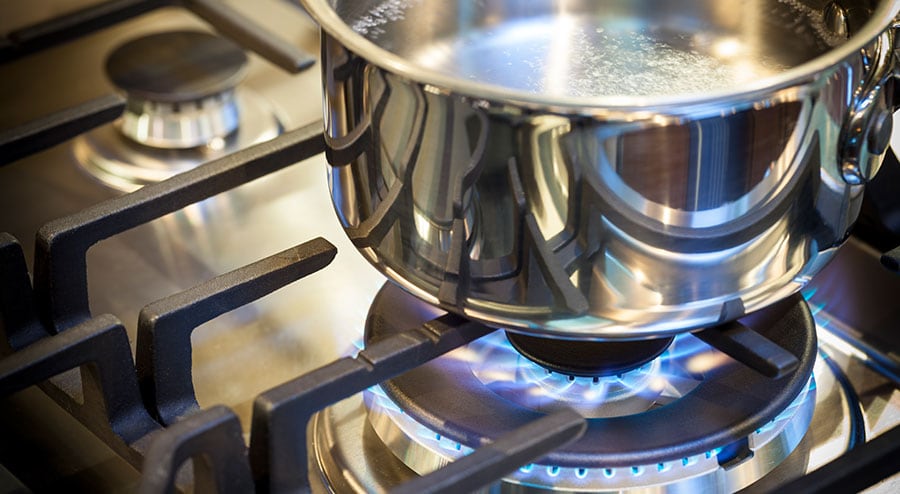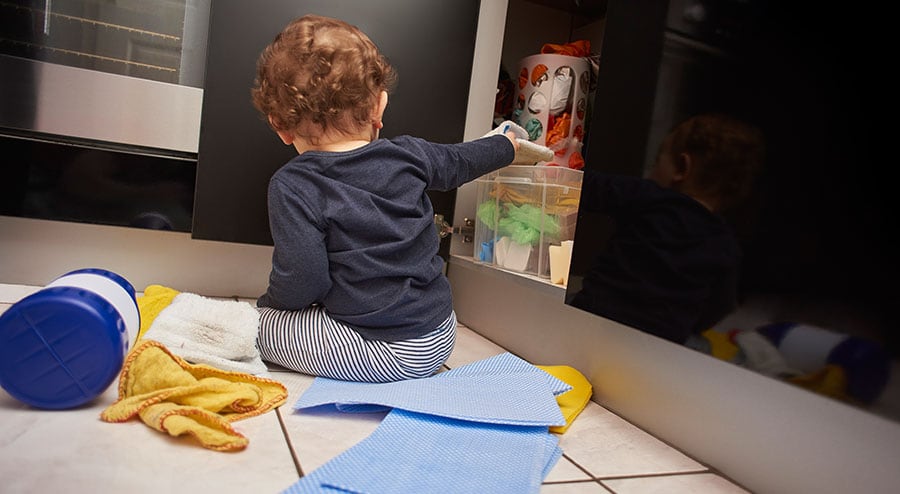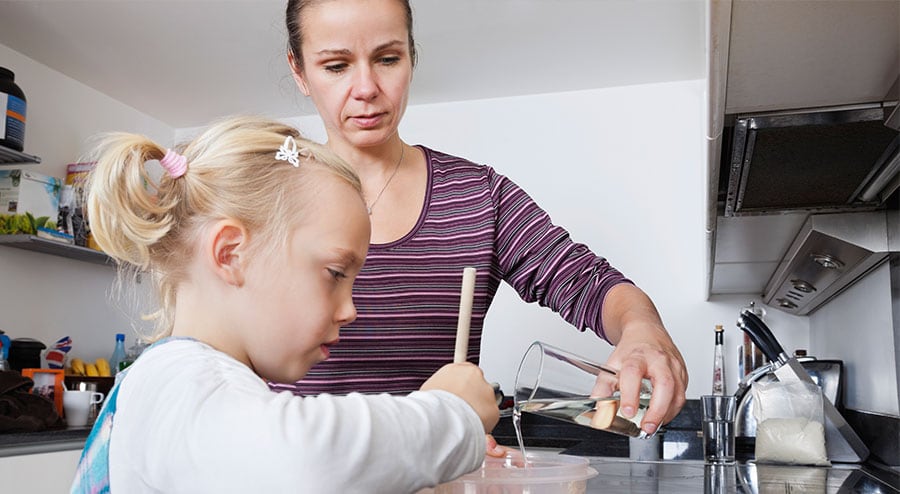Kitchens have become the most important room in the modern home, and houses are increasingly being designed to make the kitchen the center of family life as well as the place where people cook and eat meals. Unfortunately, however, kitchens are also full of potential risks: in 2015, for example, 50.8% of residential building fires were cooking related, according to the U.S. Fire Administration. In addition, the possibility of being injured in the kitchen is significant, especially considering that kitchen injuries can span a range of types, from knife cuts to scalds, burns, electrocution and more. The kitchen is a place where many people spend a lot of their time, so knowing the greatest risks in the kitchen and how to avoid them can help you enjoy your time cooking and preparing meals.
Preventing Kitchen Fires and Burns

Cooking fires are the most common reason for household fires and injuries in the home. Many kitchen fires happen when the stove is left unattended or when something in the oven is forgotten. Knowing how to prevent fires and what to do in the event of a fire can help you protect your property and keep members of your household safe.
- Never leave food on the stove unattended.
- Check in on food in the oven approximately every half hour during the cooking time, or every few minutes when the cooking process is nearing completion.
- Keep flammable items away from the cook top.
- Always use a timer to remind yourself to check in on meals.
- Watch for wisps of smoke when frying anything in oil. If you see smoke, turn off the heat right away.
Knowing what to do in the event of a kitchen fire can also help you protect your property, members of your household and yourself.
- Smother grease fires by putting a lid or baking sheet on the pan. Keep the lid nearby in case a grease fire occurs.
- Keep a fire extinguisher under the sink or in another easy to reach place.
- Note your fire extinguisher’s expiration date and replace it before it expires.
- If your kitchen does catch fire, leave immediately and close the door behind you.
If you do happen to burn yourself, use first aid to control the injury. Run cold water over the burn for approximately 20 minutes. If the burn is larger than a quarter, however, seek medical attention in order avoid scars and infections.
Safety With Knives
Knives cause cuts that can lead to stitches, bleeding and serious injuries. Being safe with knives can prevent accidents that disrupt dinner preparations.
- Keep your knives sharp. Sharp knives are easier to use and therefore allow for greater control over the cutting process.
- Do not hold the food you’re cutting by extending your fingers out flat over the food. Curl your fingers under and press the tops of your finger tips into the top of the food being cut. This can prevent you from cutting your finger tips.
- Use a cutting board with suction cups on the bottom to prevent the cutting board from wiggling around.
- When using a knife sharpener to sharpen your knives, follow all manufacturer’s instructions.
Hot Water and Scalding Safety

Hot liquids are capable of causing life-threatening injuries that can be life-threatening. Unfortunately, 500,000 scald burns occur in the United States every year. Protecting yourself and family members from hot liquids can save lives and prevent hospitalization.
- Keep children out of the path of traffic in the kitchen.
- Never put a hot pan where it can be reached by a small child.
- Do not hold a child while drinking a hot liquid.
- Allow hot items in the microwave to cool for a few moments before reaching in to pick up the dish.
- Use the lid to shield your arm from steam if removing a lid from a hot pan.
- Use the back burners on the stove to prevent children from reaching pans on the stove.
- Replace oven mitts on a regular basis as they become thin, worn or burned.
- Turn pot handles away from the edge of the stove.
Small Appliance Safety
Small countertop appliances must be used properly in order to prevent burns and other accidents.
- Never set items over a toaster.
- Keep flammable items away from the opening of the toaster.
- Replace old, unprotected outlets with GFCI outlets, which will shut off power if there’s a risk of electrocution.
- Keep small appliances away from the sink.
- Wrap up excess lengths of cord on countertops to prevent them from becoming tangled in other objects on the counter.
- Register small appliances with the manufacturer and pay attention to product recall notices.
Household Cleaners

Household cleaners can be a danger in many ways. Near food preparation areas, household cleaners can lead to unintentional poisoning. Left in lower parts of the kitchen, such as the area under the sink, household cleaners can also be a threat to small children who might find the cleaner and try to use or swallow it.
- Baby proof all cabinets that have household cleaners inside.
- Do not store household cleaners near food preparation areas such as countertops.
- Follow all manufacturer’s instructions when using cleaners.
- Use cleaning gloves when using cleaners, especially when using abrasive or corrosive cleaners.
- Do not use cleaners on pots and pans unless the cleaners are specifically made for use on cooking implements.
- Use cleaners in well-ventilated spaces.
Food Safety
Foods left out too long, stored in improper conditions and eaten after their expiration date can easily lead to food poisoning. Some types of food poisoning can lead to gastrointestinal discomfort, while other types of food poisoning can lead to hospitalization or death. Proper food storage is critical for keeping members of your household safe.
- Set the refrigerator to the manufacturer’s recommended temperature.
- Do not keep foods past the expiration date.
- Clean out your refrigerator and throw away expired foods on a weekly basis.
- Go through your cabinets and throw away expired foods on a quarterly basis.
- Do not leave perishable foods sitting in direct sunlight or sitting out in warm kitchens.
- Smell perishable foods before serving them or using them in recipes. Look for signs of spoilage, such as discoloration and fuzzy growths.
- Discourage family members from sampling foods before they have finished cooking.
- Never eat foods containing raw eggs or raw meat.
Stay Safe
Staying safe in the kitchen requires vigilance, common sense, and some problem-solving skills. Following these tips, you can keep your kitchen safe through years of mealtimes and family connection.




